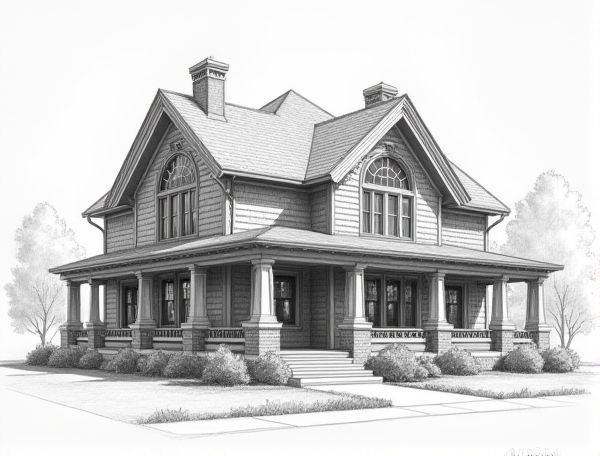
Photo illustration: Victorian home design with stained glass transoms
Victorian home design with stained glass transoms adds timeless elegance and intricate detail that enhances your living space by capturing light and creating colorful focal points. Discover how incorporating these charming architectural features can transform your home by reading more in the article.
Introduction to Victorian Home Design
Victorian home design features intricate woodwork, steeply pitched roofs, and ornate decorative trim that reflect the elegance of the 19th century. Your Victorian home incorporates bay windows, patterned shingles, and vibrant color schemes to create a timeless, visually striking aesthetic.
Historical Significance of Stained Glass Transoms
Stained glass transoms have historically served as both decorative and functional elements in architecture, symbolizing artistic craftsmanship and cultural heritage from the Gothic and Victorian eras to modern designs. Your home design can incorporate these timeless features to enhance natural light while adding a unique, historically rich focal point that reflects centuries of design evolution.
Key Features of Victorian Architecture
Victorian architecture is characterized by intricate woodwork, steep gabled roofs, and decorative trim known as "gingerbread," creating a distinctive and ornate aesthetic. Your home can benefit from stained glass windows, asymmetrical facades, and vibrant color schemes that highlight the historical charm and craftsmanship of this design era.
Materials and Techniques in Stained Glass
Stained glass art involves using colored glass pieces held together by lead cames or copper foil, creating intricate patterns and vibrant designs ideal for windows and decorative panels. Traditional techniques include hand-cutting glass, painting with vitreous paint for detailing, and kiln firing to fuse the paint, while modern methods incorporate laminated and textured glass for enhanced durability and aesthetic appeal. High-quality materials such as mouth-blown or opalescent glass ensure vivid coloration and light transmission, elevating the overall ambiance and artistic value in home design.
Popular Stained Glass Patterns in Victorian Homes
Victorian homes prominently feature intricate stained glass patterns such as floral motifs, geometric designs, and ornate scrollwork, enhancing both natural light and aesthetic appeal. These patterns often incorporate vibrant jewel tones and symmetrical layouts, reflecting the era's emphasis on craftsmanship and decorative artistry.
Benefits of Stained Glass Transoms
Stained glass transoms enhance your home's aesthetic by adding vibrant colors and intricate designs that create unique focal points above doors and windows. These decorative panels allow natural light to filter through while maintaining privacy, contributing to energy efficiency and a brighter interior. Incorporating stained glass transoms can increase your property's value by combining artistic craftsmanship with functional architectural elements.
Incorporating Stained Glass into Modern Victorian Interiors
Incorporating stained glass into modern Victorian interiors enhances your space with vibrant colors and intricate patterns, adding a timeless charm that complements ornate moldings and vintage-inspired furnishings. This design choice creates focal points in windows and doors, infusing natural light with artistic brilliance while preserving the elegance of Victorian architectural details.
Restoration and Preservation of Victorian Transoms
Restoration and preservation of Victorian transoms require skilled craftsmanship to maintain their intricate woodwork and original stained glass features, enhancing both aesthetic appeal and historical value. Your home benefits from these carefully preserved architectural details by retaining authentic character while improving natural light diffusion and ventilation.
Choosing Authentic vs. Reproduction Stained Glass
Choosing authentic stained glass offers unmatched craftsmanship, unique color variations, and historical value that reproductions often lack, enhancing a home's architectural character. Reproduction stained glass provides cost-effective options with modern durability and easier installation, making it suitable for budget-conscious projects without compromising aesthetic appeal.
Enhancing Curb Appeal with Decorative Transoms
Decorative transoms elevate curb appeal by allowing natural light to brighten entryways while adding architectural interest to home facades. Custom-designed transoms feature intricate glass patterns or stained glass that complement various architectural styles, from craftsman to modern farmhouse. These elements not only increase aesthetic value but also enhance energy efficiency by reducing the need for artificial lighting.
 homedesy.com
homedesy.com